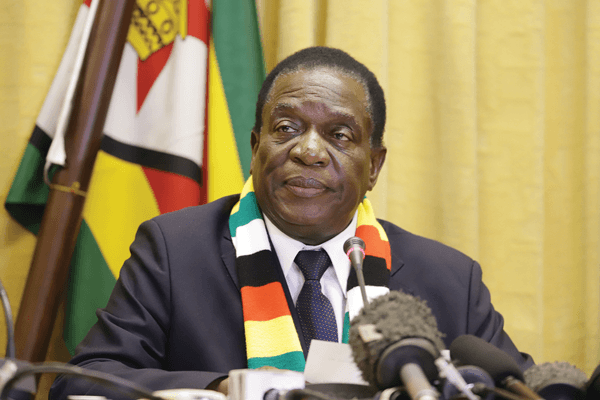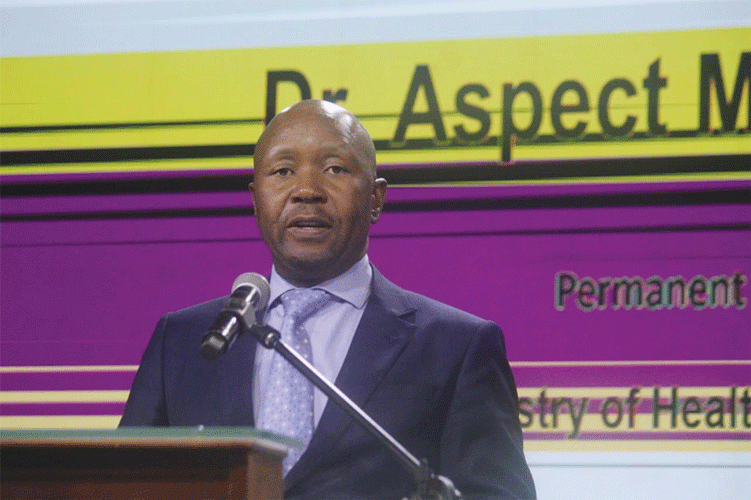
PRESIDENT Emmerson Mnangagwa yesterday extended the national lockdown by two more weeks to fight the raging coronavirus, saying it was “a very hard but unavoidable decision in circumstances which we found ourselves in”.
BY BRENNA MATENDERE/NKULULEKO SIBANDA
Mnangagwa, in a special address to the nation to mark the end of the first 21-day national lockdown which became effective on March 30, said the extension to May 3 would allow his government to implement measures to address new challenges posed by COVID-19 to the country.
“Guided by these realities and to allow ourselves better leeway to prepare for worse times which are likely ahead, government has decided to extend with immediate effect, the national lockdown by a further 14 days. That means the national lockdown that would have expired by midnight stands extended by another two weeks up to the third of May 2010,” he said.
Mnangagwa, however, partially lifted the lockdown grip on manufacturers in the informal sector, saying these would be allowed to resume operations though under strict health safeguards to avoid the spread of the novel virus which has claimed three lives from the 25 cases reported in Zimbabwe.
“In respect of our manufacturing sector, I have further directed that limited operations resume in the national interest, but mindful of the national health safeguards.
“This reprieve covers our manufacturers in our informal sector as well as SMEs who will have to use these two weeks to rebuild their capacities and stocks. The responsible ministry is also directed to ensure that there is order in that sector which is so critical to livelihoods,” Mnangagwa said.
“The country is yet to meet the conditions for lifting of the lockdown that were recently announced by the World Health Organisation (WHO). Government will stop at nothing to ensure our (health delivery) institutions are fully equipped and stocked and ensuring our health personnel are fully kitted and motivated.
- Chamisa under fire over US$120K donation
- Mavhunga puts DeMbare into Chibuku quarterfinals
- Pension funds bet on Cabora Bassa oilfields
- Councils defy govt fire tender directive
Keep Reading
“From the foregoing, three objectives become apparent, that is we must flatten and arrest the infection curve, secondly, we must raise the line of testing through expanded testing, and we must see more COVID-19 recoveries so our health systems are not overburdened,” he said.
He added that government would, after two weeks, announce the new direction the country would take going forward.
But political and economic analysts warned that the extension would bleed the economy and trigger social unrest in the absence of adequate social safety nets to cushion vulnerable communities and struggling businesses.
Economist Tony Hawkins warned that the economy will continue to shrink under the extended lockdown.
“Lockdown extension was expected. With South Africa in lockdown local businesses are hamstrung by transport value chain and supply chain logistics. Whatever the impact of the plan to allow mining and industrial firms to reopen the economy will continue to shrink and the currency will depreciate further.”
Another economist John Robertson said: “When one looks at this decision to extend the lockdown from the side of caution, I think it is indeed a right decision that the President has made to extend the lockdown by another 14 days. It was going to be difficult for him to just lift the lockdown like that because there are high chances that when people get back to work, they could actually infect each other more. Government now has a chance to put its hand on the pulse and become more aggressive in the testing.
“The extension in actual fact is an admission that not enough testing had been done to this moment and the move will indeed give the government more time to do what it was supposed to have done.
The decision, however, has a cost to it in the business side of things. I am very positive that not all businesses are going to be able to get back to business after these two more weeks. That is the reality because already with these three weeks that have gone by, not all companies were going to get back to business. With another two weeks to go, the situation will indeed get worse.”
Zimbabwe’s biggest trading partner, South Africa and Rwanda recently extended the lockdowns in their counties at a time the United Nations Economic Commission for Africa predicted a surge in COVID-19 cases from about 21 000 now to 10 million within the next six months.
Under the worst-case scenario with no interventions against the virus, Africa could see 3,3 million deaths and 1,2 billion infections, the UN agency warned.
Africa has more than 21 317 confirmed cases of COVID-19 and about 1 080 deaths so far.
Political analyst Eldred Masunungure said the extension was likely to cause social upheaval as majority of people in the informal sector would vent their anger on the strict measures.
“That there will be political and social upheaval is inevitable because it is already happening elsewhere like in the US where people took to the streets. The lockdown extension will definitely have political costs for Mnangagwa because people actually survive from hand to mouth and some cannot budget for more than three days.
“While government says it will cushion struggling people, it cannot do so to about six to seven million people because almost 85 to 95% people are in the informal sector.
“I may not predict the extent of the intensity of the upheaval, but it will come and that is inevitable.”
Confederation of Zimbabwe president Henry Ruzvidzo said they expected more business stimulants from government.
“The move to open up manufacturing is welcome. Funding of operations will be challenging, engagements on this will continue. The extension of social distancing measures is important as mitigation measures continue to be put in place,” he said.
“Whilst recognising the challenges faced by the fiscus to fund the health sector response and to attend to business continuity challenges we did expect announcement of additional stimulus measures. We expect this is still under consideration.”
Healthcare providers pleaded with government to roll out personal protective wear to all health institutions to safeguard the frontline workers against infection.
Community Working Group on Health executive director Itai Rusike said the extension should have been announced in advance to help the nation to accept and implement it ensuring safety through buy-in and compliance.
“Even though it is true that the country was not yet ready to lift the lockdown restrictions, there is pressure from the business community and the informal economic sectors to lift the lockdown and get back to business.
“It is essential for the government to make informed decisions about how to cautiously move from total lockdown to a partial lockdown and communicate that rational clearly.”
Rusike said the government should inform citizens on risks around lifting the lockdown and re-opening business and other sectors when there is a spike in new cases.
“Lifting the lockdown at this early stage when there is a spike in new cases was going to increase the risk of COVID-19 spread, hence the decision taken by the President is the correct one as it is also in line with the regional trends,” he said, adding that government should increase capacity in testing, personal protective equipment, social safety provision for the vulnerable communities, healthcare and medical resources.











